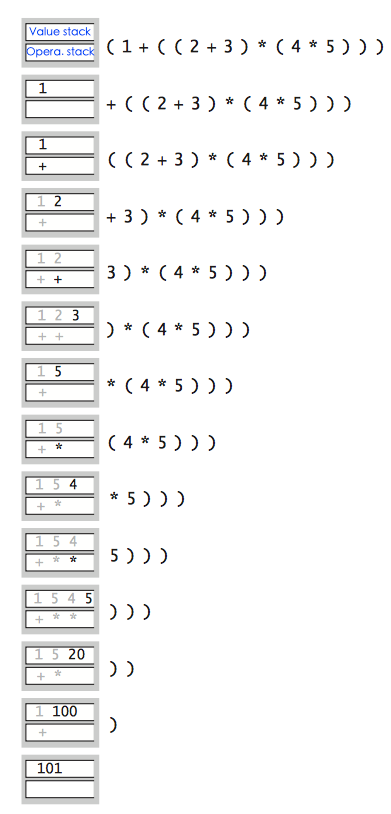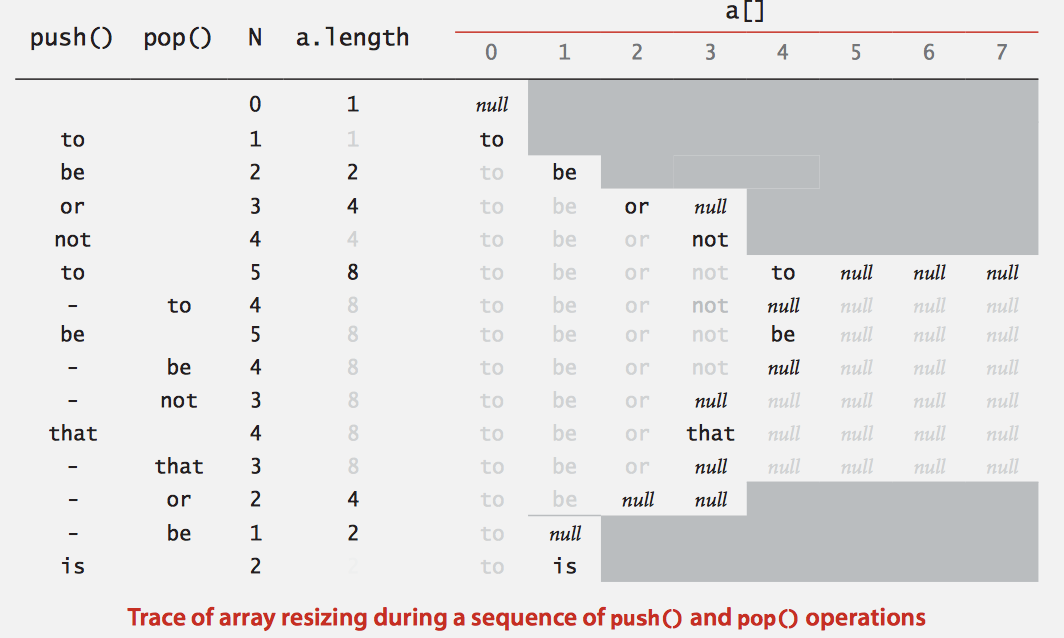Why Stack?
-
Why not other Java powerful colllection libraries?
Powerful like “Swiss Knife” but lack of efficiency.
-
Except for efficiency, when stack is more convenient?
-
Parsing in a compiler.
-
Back button in a Web browser.
-
Implementing function calls in a compiler. (Function call: push local environment and return address; Return: pop return address and local environment.)
Recursive function: Can always use an explicit stack to remove recursion.
-
Excellenct usage example of stack: Two-stack algorithm. [E. W. Dijkstra]
Goal
Evaluate infix expressions.
( 1 + ( ( 2 + 3 ) * ( 4 * 5) ) )
- Only deal with single number,
+,*
Algorithm
- Value: push onto the value stack
- Operator: push onto the operator stack
- Left parenthesis: ignore
- Right parenthesis: pop operator and two values; push the result of applying that operator to those values onto the value stack.
Go

Implement
public class Evaluate{
public static void main(String[] args){
Stack<String> ops = new Stack<String>();
Stack<Double> vals = new Stack<Double>();
while (!StdIn.isEmpty()){
String s = StdIn.readString();
if ( s.equals("(") ){} // ignore
else if ( s.equals("+") || s.equals("*") ){ // push operator
ops.push(s);
}
else if ( s.equals(")") ){
String op = ops.pop();
if ( op.equals("+") ){
vals.push(vals.pop() + vals.pop());
}
else if ( op.equals("*") ){
vals.push(vals.pop() * vals.pop());
}
}
else{ // number
vals.push(Double.parseDouble(s));
}
}
StdOut.println(vals.pop());
}
}
Further observations
- 后置运算符不影响算法
( 1 ( ( 23 + ) ( 4 5 *) * ) + )
- 无运算符也不影响算法!
1 2 3 + 4 5 * * +
观察到所有运算符都伴随着),那么直接以运算符为出栈计算条件。
Style
- Modilar reusable libraries: 接口实现分离
Stack
- FILO
Interface
public class StackOfStrings{
StackOfStrings();
void push(String item);
String pop();
boolean isEmpty();
}
Implement by Linked list
public class StackOfStrings{
private class node{
String item;
Node next;
}
private first = null;
//public StackOfStrings()
public void push (String item){
Node oldFirst = first;
first = new Node();
first.item = item;
first.next = oldFirst;
}
public String pop(){
String ret = first.item;
first = first.next;
return ret;
}
public boolean isEmpty(){
return first == null;
}
}
Implement by Array
public class StackOfStrings{
private String[] s;
private int N = 0; // ahead of exist data
// cap: capacity
public StackOfStrings(int cap){
s = new String[cap];}
public boolean isEmpty(){
return N == 0;}
public void push(String item){
s[N++] = item;}
public String pop (){
String ret = s[--N];
// for java avoid 'loitering'
S[N] = null; // remove the reference of the poped one
return ret;}
}
Defect: determine the maximum capacity ahead of time
Implement by Resizing Array
Grow size
To realize a resizing array stack, we have 2 approaches:
- Create a new array 1 size bigger mirrors old array and +1 item once push
- Create a new array TWICE bigger mirror old array once FULL(term: Amortize Analyse)
But App[1] is to expansive:
- Copy time: 1+2+3+…+N = N^2/2
App[2] is cheaper:
- Copy time: 1+2+4+8+…+N (共log(2,N)项) = 2^(log(2,N)) - 1 = 2N -1;
Shrink size
-
Halve(1/2) the array when array is HALF full
Get expansive in worst case: consider the array is half full, and operations tasks just
Push-Pop-Push-Pop-...which lead toDoubleSize-HalveSize-DoubleSize-HalveSize-...
A better solution is:
-
Halve size when array is ONE-QUARTER full
if(N>0 && N==s.length/4) resize(s.length/2);So, in this case, the array is always between 25% and 100% full. This can achieve a more efficient performance in average, but may cause some interupt all of the sudden.
Here’s an example:

Comparison
Memeory usage
-
Linked list: 16B(Object head) + 8B(inner class overhead) + 8B(ref to string) + 8B(ref to next node) = 40B per item.
-
Resize array: 8B(ref to string) per item(totally full) ~ 32B per item(1/4 full, worst case)
Implementation
- Linked list: constant time for each operation; Extra time/space to deal with the link
- Resize array: shorter amortized(average) time; less space(in any case)
Queues
- FIFO
Interface
public class QueueOfStrings{
QueueOfStrings();
void enqueue(String item);
String dequeue();
boolean isEmpty();
}
Implement by Linked list
public class QueueOfStrings{
private class Node{
String item;
Node next;
}
private Node first, last;
public void enqueue(String item){
Node oldlast = last;
last = new Node();
last.item = item;
last.next = null;
if (isEmpty()){
first = last;
}
else{
oldlast.next = last;
}
}
public String dequeue(){
String ret = first.item;
first = first.next;
if(isEmpty()){
last = null;
}
return ret;
}
public boolean isEmpty(){
return first == null;
}
}
Generics
Usage
Stack<Apple> s = new Stack<Apple>();
Apple a = new Apple();
s.push(a); // OK
Orange b = new Orange();
s.push(b); // Error
a = s.pop();
Implement
public class FixedCapacityStack<Item>{
private Item[] s;
// N is 1 ahead of the current item
private int N = 0;
public FixedCapacityStack(int cap){
// Ugly cast, but
// s = new Item[cap];
// is not allowed in the Java
s = (Item[]) new Object[cap];
}
public boolean isEmpty(){
return N == 0;
}
public void push(Item item){
s[N++] = item;
}
public Item pop(){
return s[--N];
}
}
Autoboxing
for the primative types, like int, double:
Stack<Integer> s = new Stack<Integer>();
s.push(17); // = s.push(Integer.valueOf(17));
int a = s.pop(); // = s.pop().intValue();
Iteration
Keep the internal representation black by implement the java.lang.Iterable interface.
public interface Iterable<Item>{
Iterator<Item> iterator();
}
public interface Iterator<Item>{
boolean hasNext();
Item next();
void remove(); // optional
}
So, the data structure can be used like:
for (String s : stack){
StdOut.println(s);
}
// or
Iterator<String> i = stack.iterator();
while (i.hasNext()){
String s = i.next();
StdOut.println(s);
}
Implementation
Stack iterator: linked-list implementation
import java.until.Iterator;
public class Stack<Item> implements Iterable<Item>{
...
public Iterator<Item> iterator(){
return new ListIterator();
}
private class ListIterator implements Iterator<Item>{
// current is the next, which has not been poped
private Node current = first;
public boolean hasNext(){
return current != null;
}
public void remove(){ /* not supported */ }
public Item next(){
Item ret = current.item;
current = current.next;
return ret;
}// end ListIterator.next()
}// end internal class: ListIterator
}// end public class: Stack